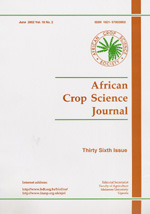
|
African Crop Science Journal
African Crop Science Society
ISSN: 1021-9730
EISSN: 1021-9730
Vol. 21, No. 3, 2013, pp. 245-254
|
 Bioline Code: cs13025
Bioline Code: cs13025
Full paper language: English
Document type: Research Article
Document available free of charge
|
|
|
African Crop Science Journal, Vol. 21, No. 3, 2013, pp. 245-254
| fr |
INTER-FERTILITY AMONG FEMALE PARENT CLONES OF PINEAPPLE INVOLVED IN A 6X6 COMPLETE DIALLEL CROSSING SYSTEM BASED ON TYPOLOGICAL APPROACH
ISSALI, A.E.; BADOU NGUESSAN, A.E.; THIEMELE, D.F.; AMONCHO, A.; NGORAN KOUA, S.B.; KEASSEMON KONE, H.C.; KOFFI, Z.E.B. & SANGARE, A.
Résumé
Le programme d’amélioration génétique de l’ananas ( Ananas comosus

L.) en Côte d’Ivoire considère la diversification fruitière comme une composante clé pour l’industrie internationale de l’ananas. L’objectif de la présente étude était de déterminer la compatibilité sexuée de clones femelles d’ananas récemment crées en Côte d’Ivoire. Trois clones hybrides femelles désignés 410-106-33, 410-200-15, 103-104-6, une variété, connue sous le vocable de Queen Victoria RE43, ainsi que deux variétés Cayenne lisse HA10 et HA25 utilisés comme témoins, ont été testés dans cette étude. Ils ont été inter-croisés selon un plan de croisements diallèle complet 6 x 6 avec autofécondations. Les résultats ont montré que le clone hybride femelle 410-200-15 a été le moins inter-compatible, suggérant qu’il peut être cultivé indifféremment en parcelles mono ou multiclonales. Il a été suivi par les géniteurs RE43 et 410-106-33. Un tel comportement pourrait être dû à la parenté existant entre ces trois clones. A l’opposé, le clone hybride 103-104-6 a exprimé la plus haute inter-compatibilité. Il devrait être soumis à des back crosses successifs, utilisant le parent HA10 comme donneur, avant les évaluations en milieu réel. Les clones femelles 410-106-33 et RE43 ont produit respectivement les fruits les plus lourds et les plus légers.
Mots Clés
Ananas comosus; back-cross; Côte d’Ivoire
|
| |
| en |
INTER-FERTILITY AMONG FEMALE PARENT CLONES OF PINEAPPLE INVOLVED IN A 6X6 COMPLETE DIALLEL CROSSING SYSTEM BASED ON TYPOLOGICAL APPROACH
ISSALI, A.E.; BADOU NGUESSAN, A.E.; THIEMELE, D.F.; AMONCHO, A.; NGORAN KOUA, S.B.; KEASSEMON KONE, H.C.; KOFFI, Z.E.B. & SANGARE, A.
Abstract
Pineapple ( Ananas comosus

L. Merr) breeding programme in Côte d’Ivoire considers fruit diversification as key component in the international pineapple industry. The objective of this study was to determine the sexual compatibility of female pineapple clones recently developed in Côte d’Ivoire. Three female hybrid clones, 410-106-33, 410-200-15, 103-104-6; one variety, known as Queen Victoria RE43; as well as two Smooth Cayenne varieties HA10 and HA25 used as controls, were tested in this study. They were inter-crossed according to a 6x6 complete diallel mating system with selfings. Results showed that female hybrid clone 410-200-15, was the least inter-compatible; implying that it can be indifferently cultivated in single or mixed-crop fields. This was followed by the genitors RE43 and 410-106-33. The response pattern could be due to the relatedness existing among these three clones. Conversely, hybrid clone 103-104-6 was the most inter-compatible. In this case, it needs to undergo successive back-crosses, using the parent HA10 as donor, before on-farm evaluations. The female clones 410-106-33 and RE43 produced the heaviest and the lightest fruits, respectively.
Keywords
Ananas comosus; back-cross; Côte d’Ivoire
|
| |
© Copyright 2013 - African Crop Science Journal
|
|
